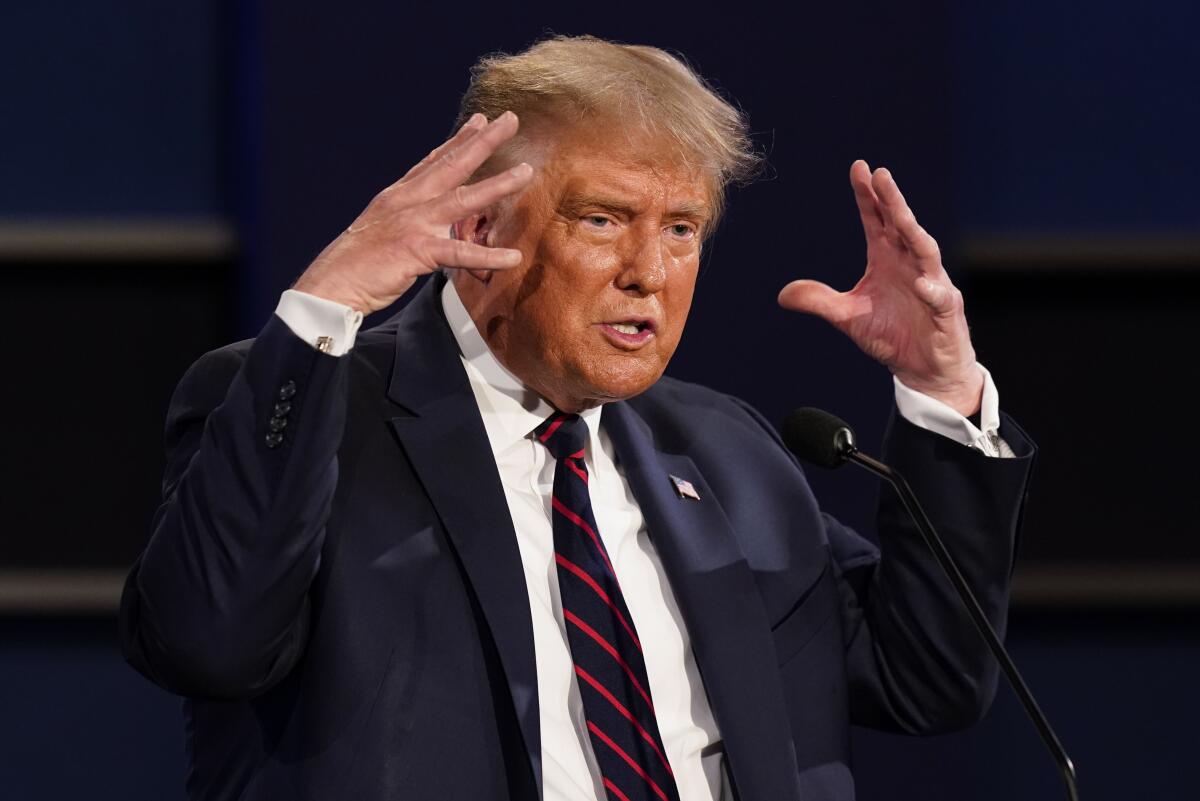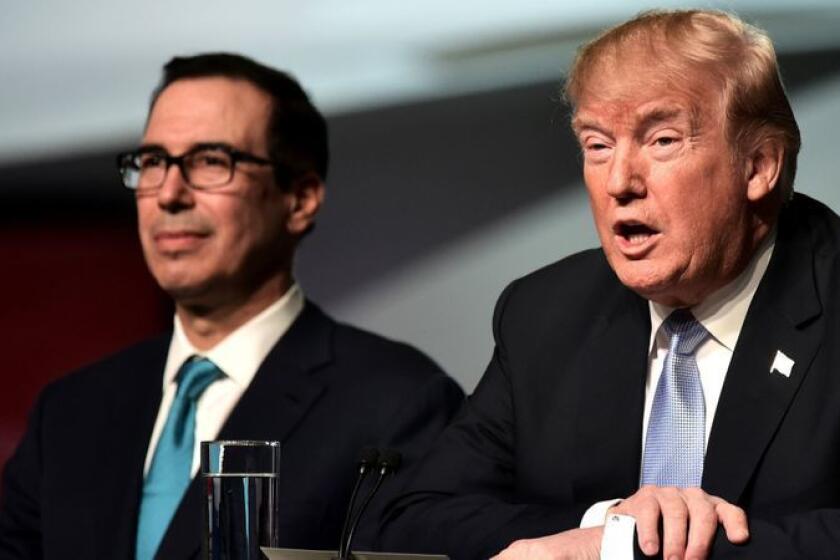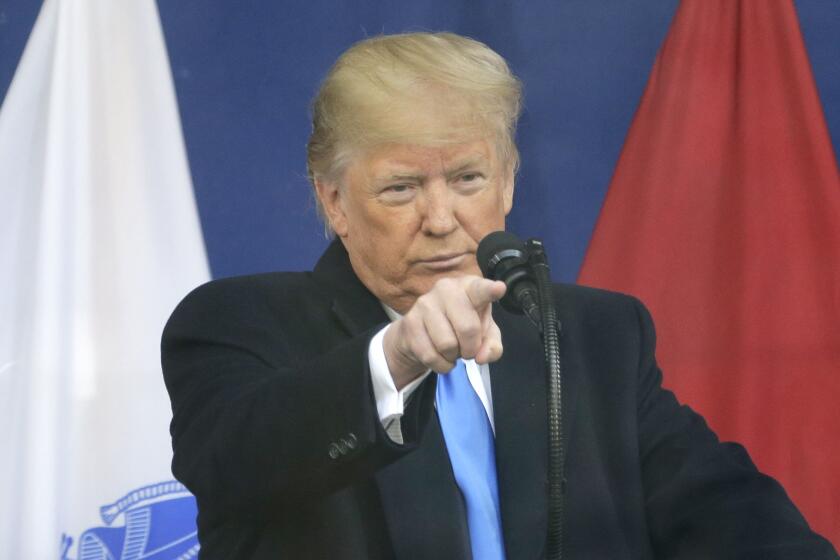I’ve been wrong for two decades. Candidates for president and governor must release their taxes

- Share via
SACRAMENTO — OK, I’ve been wrong. President Trump convinced me even before his disgraceful debate performance. Everyone seeking to lead our country should publicly release their tax returns.
Trump’s stunning case cries out for full tax disclosure by any presidential nominee of a major party. And my flip-flop was validated in Tuesday’s dark debate that was so painful to watch.
For two decades, I’ve argued that pressuring presidential and gubernatorial wannabes to show voters their income tax returns amounted to an unjustified invasion of privacy.
The needlessly nosy had no business peeping at which charities a candidate donated to and how much was given. For that matter, they didn’t need to know how much money the candidate made.
Candidates for federal and state office already must fill out statements of economic interest that purport to show their investments. But these reports are so vague they’re essentially useless. They should be greatly strengthened, both in Washington and Sacramento.
Politicians are very unlikely to do that, however.
Trump’s tax avoidance is so egregious that it has turned me into a strong advocate of presidential and gubernatorial candidates releasing their returns.
President Trump is right about one thing: He shouldn’t have to publicly release his tax returns.
Trump is the first president since Watergate who has refused to make public his income tax data. Now we know why, thanks to an investigation by New York Times reporters. He would have looked like a tax evader — maybe even a cheat — and tarnished his image as a highly successful, deal-making business tycoon.
When voters elected Trump in 2016, they should have known that in 10 of the previous 15 years the self-proclaimed billionaire and real estate mogul paid no federal income taxes because of declared business losses, according to the Times, which cited leaked returns.
For 2016 and 2017, when he ran for president and first occupied the Oval Office, Trump paid only $750 in federal income taxes each year, the Times reported. For context, the Internal Revenue Service figures the average tax filer paid about $12,200 in 2017.
You may recall that in 2017, Trump and the Republican-led Congress enacted legislation particularly harmful to salaried homeowners in high-tax states such as California. They capped federal deductions on state and local taxes — such as property and income — at $10,000.
Trump and Congress also eliminated deductions for salaried workers’ job expenses not reimbursed by employers. Some of these expenses — such as home office costs — are now particularly necessary during the COVID-19 pandemic.
But the same legislation preserved the tax loopholes Trump used to avoid income taxes and added some extras.
Americans also should have learned from Trump that in his first two years as president, he received $73 million from foreign operations — potential conflicts of interest.
Voters likewise could have used this information: Trump received federal income tax refunds totaling $72.9 million, which the IRS is auditing. And he’s carrying $421 million in loans and debt. Who has him on the hook? We don’t know, but there’s an odor.
Democratic legislators passed and Gov. Gavin Newsom signed a “gotcha” bill in August intended to force Trump — and any presidential candidate — to publicly release their income tax returns. A candidate who refused would be barred from the California presidential primary ballot. Not so fast, said the state’s highest court.
And here’s this tidbit many voters would have enjoyed: He deducted $70,000 to style his hair for the TV show “The Apprentice.”
But Trump aside, the disclosure of tax data gives voters some confidence that an office seeker believes there’s nothing to hide. It may show the candidate is squeaky clean on taxes and a good risk for public office.
If the tax history looks shady, voters wouldn’t be blindsided if an elected official turned out to be a tax cheat.
Trump lied about his tax history in the debate, based on the Times’ reporting. Case closed. As his Democratic opponent Joe Biden said, “Everyone knows he’s a liar.”
Biden should have pounded Trump on taxes but didn’t. He finally mentioned it briefly: “This guy paid a total of $750 in taxes….”
“That’s wrong. Many millions,” Trump interrupted for the zillionth time.
Moderator Chris Wallace asked Trump whether the $750 figure was correct for each of the two tax years.
Trump: “I paid millions of dollars in taxes, millions of dollars of income taxes.…”
Biden: “Show us your tax returns.”
Trump: “You’ll see it as soon as it’s finished.…”
Presumably the president meant finished being audited. But he could legally show voters the returns anytime. He has been falsely promising to for years.
Wallace: “Will you tell us how much you paid in federal income taxes in 2016 and 2017?”
Trump: “Millions of dollars….”
Biden ended the discussion by asserting that Trump “pays less taxes than a schoolteacher.”
“He says he’s smart because he can take advantage of the tax code,” Biden said. “That’s why I’m going to eliminate the Trump tax cuts.”
Those were tax cuts for corporations and the rich that raised taxes for middle-class homeowners.
In the future, we should know how much a presidential or gubernatorial candidate is gaming the tax code before voting.
Starting in 2022, candidates for California governor will be required to unveil their taxes as a price for getting on the ballot. I’d rather have continued to make that voluntary rather than law.
In a petty bill, Gov. Gavin Newsom and fellow Democrats in the Legislature also tried to force Trump to release his taxes in order to run in California. Courts found that to be blatantly unconstitutional.
But there should be strong voter pressure on presidential candidates to open up their tax files and bad consequences if they refuse — such as being compared to Trump.
More to Read
Sign up for Essential California
The most important California stories and recommendations in your inbox every morning.
You may occasionally receive promotional content from the Los Angeles Times.
















